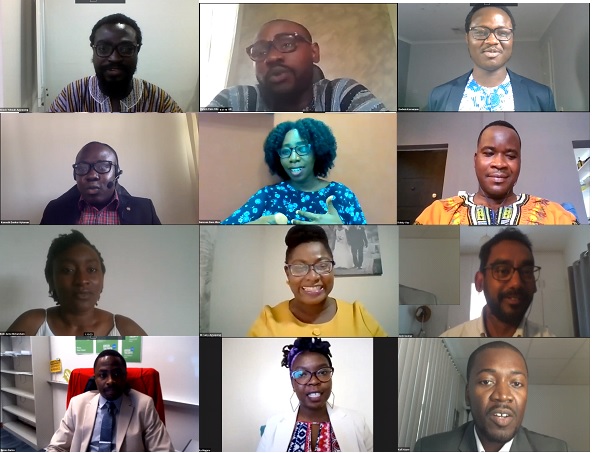The Ashesi University Real Estate Club, supported by Yecham Property Consult, recently organised a webinar to reassess conventional modes of learning, as well as promote sustainable living practices amongst a youth group, that are our next decision-makers.
Under the theme “The Future of our Learning Spaces”, panellists explored how changes in building design will affect the student experience across various university campuses and how physical learning and virtual learning can find a point of convergence.
President of the club, Brian Botchway set the tone for the discussion by reiterating the need to spark this timely discussion, in light of the interruption brought about by the COVID-19 pandemic, which inspired the Club’s partnership with Yecham Property Consult, IFC EDGE Program, First National Bank and Republic Bank to deliver the webinar.
To put the discussion in the larger context of green or sustainable living, Dansoaa Adote, a Real Estate Consultant led the green living discussion with a team of expert panellists. Dr Kenneth Appiah Donkor-Hyiaman Lecturer in Property Development and Sustainability, Department of Land Economy, Kwame Nkrumah University of Science and Technology, reemphasised the need for state interventions and policy incentives to spur the appetite and uptake of green buildings, seeing that about 90% of Ghana’s building stock is delivered
by private vendors or individuals, who are largely profit focussed and not necessarily sustainability oriented.
Dennis Papa Odenyi Quansah, Green Building Lead, IFC EDGE Program also reminded attendees and private individuals to take advantage of the EDGE Software which assists in project design, investment analysis and cost saving simulations that ensure operational cost savings in the long run. Godwin Kavaarpuo, PhD Candidate, Melbourne School of Design, University of Melbourne, Australia also reminded attendees that beyond saving the environment, green buildings offered personal wellness gains through quality indoor air and operational cost savings.
Kobby Azu, Health Economist & Public Health Practitioner, Bank of Ghana, led the second discussion on the new normal at university campuses. In sharing her unique campus management experience at the onset of the COVID-19 pandemic, Dr. Lucy Agyepong, Associate Dean – Faculty of Engineering, Academic City University intimated that beyond using virtual reality tools, they had to formulate a strategy to overcome the main challenge of integrating experiential learning into their virtual sessions. With the university heavy on engineering courses and applications, the virtual sessions were a bit limiting as it could not provide the hands-on practice required.
According to Dr. Agyepong, they employed an innovative approach by simulating practice sessions over real time video recordings of active equipments and integrating it into their virtual sessions.
Architect Ruth-Anne Richardson, AGIA, Founder, Ienvisage, reemphasized the need to re-imagine the classroom learning in an asynchronous manner and see it more as a blended experience between the physical space, virtual and augmented reality. Architect Richardson summarized her contributions with a profound statement that should guide the new normal that she believes has come stay. She charged all key actors to focus, not on the hard physical build of space, but rather focus on the organization of space.
In the final discussion, moderated by Enoch Yeboah Agyepong Sustainable Development Consultant & Mechanical Engineer, the panellists, made up of Yogesh Gooljar, Director and Partner, PJC + Partners, South Africa; Dr. Amos Darko, Research Assistant Professor of Construction and Real Estate Management at The Hong Kong Polytechnic University; Kofi A. B. Asare, PhD Student, College of Design, Construction and Planning, University of Florida, USA and Rita Mugure Bachelor of Architecture Student at Jomo Kenyatta University of Agriculture and Technology (JKUAT), Kenya, all agreed that there is no going back to the old normal. For Yogesh Gooljar, the new approach to management of these educational spaces should focus on management of space as opposed to radical change in the physical aspect of the building.
Dr. Darko mentioned that from his experience, the old classroom style is now taking only 30 % of school hours while virtual learning now takes the other 70%. He was however quick to alert that there is no a one size fits all approach.
In his estimation, unique convergence points was very much a case of course or subject variability as some course may demand more in-person meetings than others.
His assertion was supported by Kofi A. B. Asare who introduced another dimension of physical spaces being points of meeting social needs and in some parts of the world, a point for accessing free food and other resources for needy students.
He further supported his assertion that some institutions access grants based on their ability to deliver on-site or in-person school programs, hence the appetite for physical learning, though may be reduced comparatively, will not diminish completely or be swallowed up by virtual learning- there will be a compromised point of convergence.
William Annoh, Research Administrator, Office of Academic Affairs, Ashesi University in his summary address, re-affirmed the University’s commitment in supporting this particular webinar and other future student engagements.










